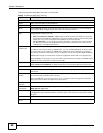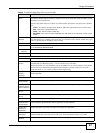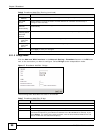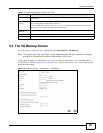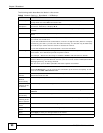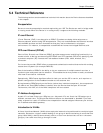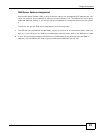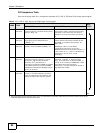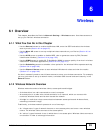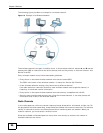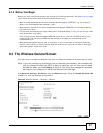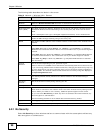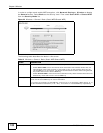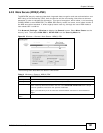
Chapter 5 Broadband
EMG5324-D10A User’s Guide
94
3G Comparison Table
See the following table for a comparison between 2G, 2.5G, 2.75G and 3G wireless technologies.
Table 9 2G, 2.5G, 2.75G, 3G and 3.5G Wireless Technologies
NAME TYPE
MOBILE PHONE AND DATA STANDARDS
DATA
SPEED
GSM-BASED CDMA-BASED
2G Circuit-
switched
GSM (Global System for Mobile
Communications), Personal Handy-phone
System (PHS), etc.
Interim Standard 95 (IS-95), the first CDMA-
based digital cellular standard pioneered by
Qualcomm. The brand name for IS-95 is
cdmaOne. IS-95 is also known as TIA-EIA-
95.
Slow
Fast
2.5G Packet-
switched
GPRS (General Packet Radio Services),
High-Speed Circuit-Switched Data
(HSCSD), etc.
CDMA2000 is a hybrid 2.5G / 3G protocol of
mobile telecommunications standards that
use CDMA, a multiple access scheme for
digital radio.
CDMA2000 1xRTT (1 times Radio
Transmission Technology) is the core
CDMA2000 wireless air interface standard. It
is also known as 1x, 1xRTT, or IS-2000 and
considered to be a 2.5G or 2.75G
technology.
2.75G Packet-
switched
Enhanced Data rates for GSM Evolution
(EDGE), Enhanced GPRS (EGPRS), etc.
3G Packet-
switched
UMTS (Universal Mobile
Telecommunications System), a third-
generation (3G) wireless standard
defined in ITU
A
specification, is
sometimes marketed as 3GSM. The UMTS
uses GSM infrastructures and W-CDMA
(Wideband Code Division Multiple Access)
as the air interface.
CDMA2000 EV-DO (Evolution-Data
Optimized, originally 1x Evolution-Data
Only), also referred to as EV-DO, EVDO, or
just EV, is an evolution of CDMA2000 1xRTT
and enables high-speed wireless
connectivity. It is also denoted as IS-856 or
High Data Rate (HDR).
3.5G Packet-
switched
HSDPA (High-Speed Downlink Packet
Access) is a mobile telephony protocol,
used for UMTS-based 3G networks and
allows for higher data transfer speeds.
A. The International Telecommunication Union (ITU) is an international organization within which governments and the private sector
coordinate global telecom networks and services.



